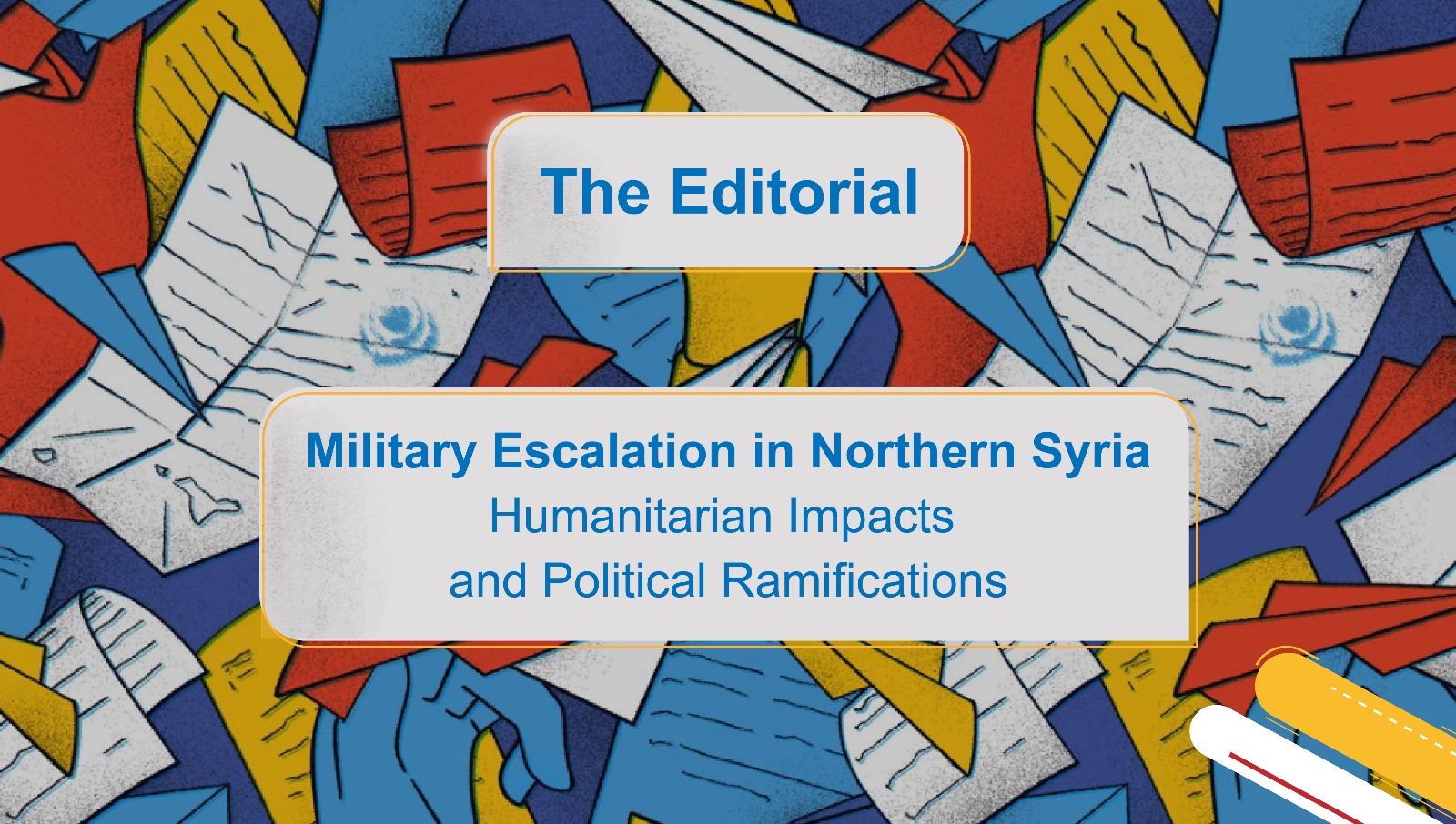Military Escalation in Northern Syria: Humanitarian Impacts and Political Ramifications
- updated: November 8, 2023
- |
The Syrian regime refrained from responding to Israel’s attacks on the airports of Aleppo and Damascus, both of which are of international significance. Instead, in collaboration with its Russian ally, during October 2023, it carried out a series of intense attacks on residential neighbourhoods and public facilities in the city of Idlib and its surroundings, as well as the western countryside of Aleppo. According to their claim, this was in response to the targeting of armed factions in Idlib, during a ceremony celebrating the graduation of officers from the Military College in Homs, resulting in civilian casualties, despite the lack of formal acknowledgment of the operation from any party.
While the world rallied against Israeli, following its bombing of the Al-Muadamiya Hospital in Gaza, the Assad regime targeted four hospitals, six schools, four camps, and popular markets. This bombardment not only destroyed buildings but also forced people to flee to tents, resulting in the killing and injury of numerous civilians, including children.
This marked the beginning of the suffering for more than 4.5 million people, with 1.9 million residing in internally displaced persons camps, turning October into a bloody month. The Civil Defense Organization in northern Syria documented the deaths of 66 civilian victims and the injury of over 270 individuals due to these attacks, which involved the use of internationally prohibited incendiary and cluster weapons. These attacks led to the suspension of educational and public health services, depriving over two million civilians of basic healthcare. These attacks directly and systematically targeted civilians and infrastructure, constituting war crimes under international humanitarian law.
Moreover, the attacks displaced thousands of families, with the number expected to rise as evacuations to temporary shelters continue. Displaced families face catastrophic conditions with urgent needs for food, clean water, shelter, healthcare, and education. The situation is feared to worsen with the approaching winter and renewed waves of displacement, especially given the ongoing humanitarian needs since the start of the war 12 years ago and the recent earthquake. This coincides with the expiration of permits for aid entry through the Bab al-Hawa crossing.
These events reflect the Syrian regime’s policy aimed at destabilising the lives of Syrians, increasing economic and psychological burdens in areas beyond its control. This policy makes life extremely difficult for civilians, increasing pressure on them to negotiate with the regime without conditions, solidifying its rule.
Through this continuous bombardment, the regime sends a message to its supporters that the war is ongoing, and they must endure the deteriorating economic conditions, especially in light of recent setbacks, including popular movements in Suwayda, a lack of tangible progress in the Arab initiative, and the fading support from regional and international actors to buoy and recycle it. Additionally, it seeks to vent public anger stemming from the Military College explosion.
Furthermore, considering the timing and the intensity of current tensions, and amid the Syrian regime’s political and economic crises, it is driven to military escalation. This is used as a means to destabilize the region, confuse the situation, assert its presence as a capable actor, and take initiative, especially in the face of recent setbacks, including the popular movement in Suwayda, lack of tangible progress in the Arab initiative, and the fading support from regional and international actors to buoy and recycle it. Military escalation also serves to hinder any political solution, as the Syrian regime understands that halting violence could open the door to political solutions, thereby ending its rule, which it vehemently opposes.
Often, women and children bear the brunt of the inhuman consequences of armed conflicts, as confirmed by data from organizations operating in Idlib, where women and children constitute the majority of victims and displaced persons. Exposure to violence and the loss of basic infrastructure such as hospitals and schools places women in extremely vulnerable positions, as they bear the greatest burden in maintaining family health and education under harsh conditions.
Moreover, displacement and reliance on camps increase the exposure of women to sexual violence and other forms of exploitation. The harsh conditions in camps deprive women of privacy and safety, making it difficult for them to access specialized healthcare, including reproductive healthcare.
Additionally, continuous bombing and the destruction of infrastructure add economic and psychological burdens on women. Often, women find themselves solely responsible for supporting their families in the absence or loss of male partners or providers due to conflicts. These pressures may lead to increased cases of depression and other psychological and physical illnesses among women.
We, in the Syrian Women’s Political Movement, call for intensified international and Arab pressure, using diplomatic channels to press the Syrian regime and its allies to cease their attacks on civilians and infrastructure in Syria. We also call for the initiation of serious peace negotiations leading to a political transition, in accordance with UN Security Council Resolution 2254 and relevant resolutions.
Furthermore, we emphasize the necessity of ensuring the continuity of opening border crossings for the passage of humanitarian aid, especially the Bab al-Hawa crossing. We urge donor countries to provide the necessary financial and logistical assistance to support displaced families and conflict-affected communities.
Additionally, we call for the implementation of international Security Council resolutions specifically related to the protection of women and children in conflict zones, providing special protection for them within camps and areas affected by war.
Finally, we demand accountability for the Syrian regime and its allies for the crimes committed against civilians, in accordance with the principles of international humanitarian law.
Ultimately, the situation in Syria remains complex and intertwined with regional and international dynamics, requiring intensive diplomatic efforts to find political solutions that ensure the protection of civilian populations and stability in the region.
The Political Committee of the Syrian Women’s Political Movement
